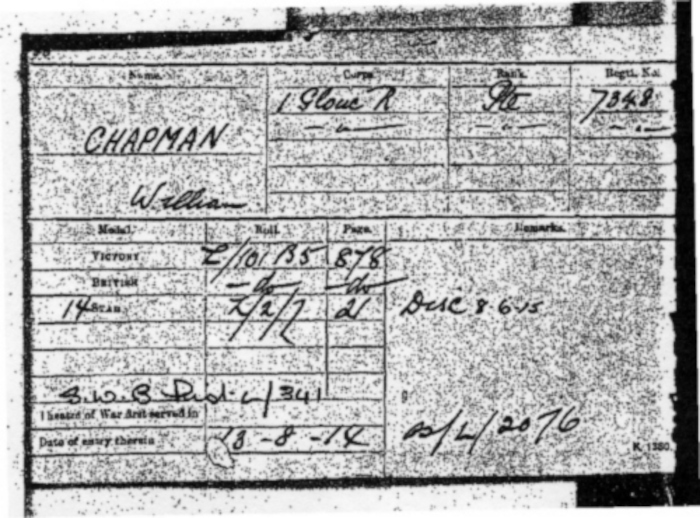Grandfather Chapman served in the First World War (1914-1918) and was wounded while at the front with the Gloucestershire Regiment.
He joined the Regiment on Tuesday, 1st December 1903 shortly after his 18th birthday, when he trained as a bandsman, learning to play the clarinet. In a combat situation, the bandsmen acted as stretcher bearers.
When I was a young boy, probably about 14 years old, I distinctly remember him telling me that he was in a war. There was a tremendous explosion. After he came to, he was stuck in the mud and was wounded in the foot. He eventually got to a field hospital 3 days later. By that time his foot was gangrenous and the medical officer gave him two choices - amputation or to plunge his foot into a bucket of boiling hot water to kill the infection. He chose the latter and lost only his middle toe.
See attached Chain of Evacuation
In later years my sister told me that his brother-in-law, Harry Pemberton, who was with the Royal Engineers in the same area, on hearing that he was wounded, was able to help him to the aid centre.
This was about all I knew of his war experiences until in May 2006 we sorted through a bag of old photos from my parents attic and found two postcards written to Granddad when he was a young soldier.
They were dated 1905 and 1907 and addressed to bandsman William Chapman, 2nd Glosters and had his army number 7348. Without this number, it would have been
nearly impossible to find his army records out of the 20 million men who served in
the First World War as he was christened Frederick Robert William and Chapman is quite a common name.
. During the 1st World War, Medal Index Cards (MIC) were issued for every soldier and contain useful information.

Regiment: 1st Gloucester
1914 Star: Given to soldiers serving in France from Aug to the end of 1914
Theatre of war 1 (this was France)
Date of entry to theatre of war: 13-8-14
Silver War Badge: given to soldiers wounded.
Discharge: 8th June 1915
From other sources I found that the 1st Gloucesters were stationed in Bordon, near Aldershot as part of the 3rd Infantry Brigade, 1st Division of the BEF under the command of Lt. General Haig.
They were among the first troops to disembark at Le Havre on the 13th August. (War had only been declared on the 4th August).
Grand-dad had been a regular soldier and after 7 years service he was allowed to leave the army, but be on immediate recall in the event of war, so he left the army to get married in 1910 and was working as a civilian. He had been stationed at Warley Barracks in Essex, the Tower of London, Aldershot and Portsmouth. In 1910 the battalion went to Malta, so this is probably the moment that he left.
When war was declared he was called back to the colours and reported to his regiment a few days before embarkation. The following extract suggests this:-
The order to mobilise was received at the Depot at about 4.30 pm on the 4th August and reservists poured in during the next two days.The same book titled THE GLOUCESTERHIRE REGIMENT IN THE WAR 1914-1918 by Everard Wyrall, published in 1931 continues:
The mobilization of the Regular reservists was completed and the required number had been dispatched to the 1st Battalion by Friday, 7th August.
It was still dark in the early hours of the 12th when the 1st Gloucesters, without bands playing or any of the flag-waving usually associated with the departure of troops to take part in an overseas war, paraded and marched to Bordon Station where they boarded two trains, the first of which arrived at Southampton at 5 a.m. and the second at 6.30 a.m.
On reaching Southampton the 1st Gloucesters went aboard (curiously enough) the S.S. Gloucester Castle, which sailed at 12.10 p.m. on the 12th.
 |
| S.S.Gloucester Castle See larger picture |
The Battalion went ashore next day at Le Havre on the 13th, which corresponds to the date on the Medal Index Card. It also shows that William Chapman was discharged on the 8th June 1915, so he would have been wounded between the first engagements with the Germans in August 1914 and June 1915. The above mentioned book was obviously written from the battalion's war diaries and gives a virtual day by day account of their movements and fortunes.
The next step in solving the riddle was to email the Gloucestershire Regimental Museum to ask for their help.
David Read then e-mailed some interesting information.
Apparently Grandad was reported wounded on the 2nd December 1914 and on the 18th January 1915. The Gloucestershire Echo reported that he was wounded on the 20th January. As his foot wound would have incapacitated him, I assume that the December 2nd wound was minor and allowed him to return to the trenches and that the January 18th-20th wound was the foot wound. It was pointed out that the dates reported did not always coincide with the actual date of the wound, as men often had to wait for several days before receiving proper medical attention.
David Read also said that the 1st Batallion spent the end of January in the
trenches at Givenchy, the companies being rotated every 2 days or so. Casualties were light, but on a daily basis mostly from shelling. As Grandad said he was wounded in an explosion, this would fit in with what was going on in his sector.
By the 11th November 1914 barely 2 officers and 100 men remained of the batallion that had landed in France in August, so by the time grandad was wounded two months later he was probably the last from his original platoon and this is what he meant when he said he was the only one left.